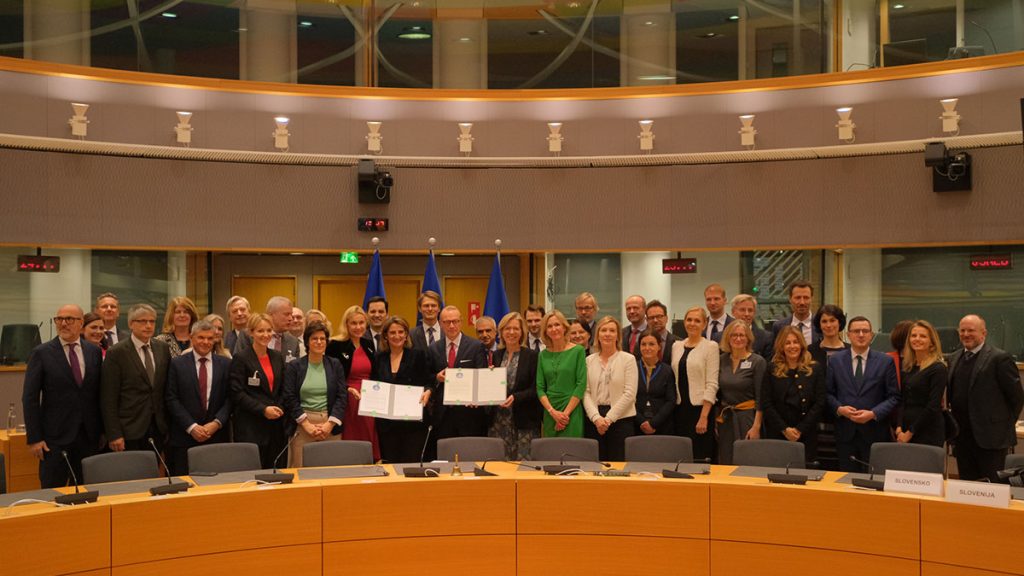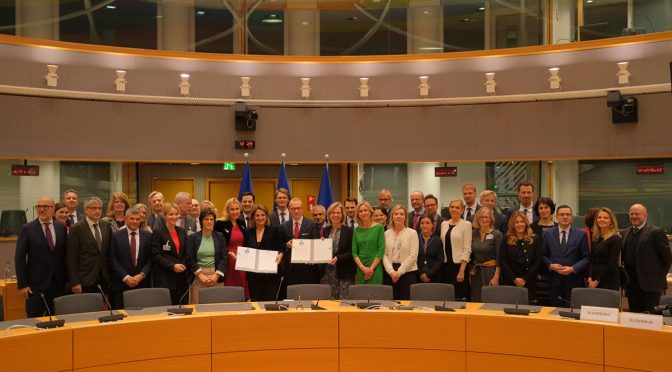In October the European Commission published the Wind Power Package: 15 immediate actions to strengthen the competitiveness of Europe’s wind value chain. The European Commission and European Investment Bank are delivering on their bits of the package already. But the bulk of the actions fall to National Governments. So today the Energy Ministers of 26 EU Member States endorsed the European Wind Charter, formally committing their countries to deliver on the actions ascribed to them under the Wind Power Package. This broad support shows that Governments have understood the strategic value of wind energy being “made in Europe” and the urgent need to strengthen Europe’s wind industry.
The EU continues to move decisively in implementing the EU Wind Power Package. Today representatives of the European Commission, 26 EU Energy Ministers* and more than 300 companies from the wind energy sector endorsed the European Wind Charter. This commits Governments to strengthen Europe’s wind energy sector and implement the actions set out in the Wind Power Package.
“Today is a huge day for Europe’s wind energy industry. 26 countries have committed to implement the actions set out in the EU’s excellent Wind Power Package. The actions on permitting, finance and auctions will help boost the expansion of wind energy and strengthen Europe’s wind industry. This is good for jobs and growth and for Europe’s energy security. And it shows Europe as a whole understands the urgent need to strengthen its wind industry”, says Giles Dickson, WindEurope CEO.
The Charter is not the first step in implementing the EU Wind Power Package that was published in October. The EU has already significantly improved access to finance for wind energy investors. The European Commission has launched a €4bn call under the Innovation Fund with grants aimed to support investment in clean tech manufacturing. And the European Investment Bank (EIB) has changed its lending rules to support factory investments and also launched a new €5bn counter-guarantees scheme for wind turbines manufacturing.
What have Member States committed to?
By signing the European Wind Charter, the 26 countries commit to urgently implement changes to wind energy auction design and permitting. They also commit to invest in Europe’s wind energy supply chain and support the infrastructure required for the expansion of wind.
On permitting there will be a rapid implementation of the streamlined permitting rules under the new Renewable Energy Directive and a new push to deploy the IT needed for the digitalisation of permitting processes.
On auctions Member States will make more use of prequalification criteria in critical areas such as cybersecurity to raise the bar on which turbines can be built in Europe. They will also ensure auction prices are indexed to reflect increases in input costs. Lack of indexation is a problem in some countries. Wind farm developers win an auction with a given price, and when they order their turbines a year later the costs have gone up and the price doesn’t work.

Member States also pledge to improve long-term visibility by publishing clear auction schedules – and 10-year plans for the expansion of wind and a 2040 outlook.
To help unlock investments in Europe’s wind energy value chain Member States will also make full use of the flexibility provided under the revised EU State aid rules. These allow Governments to cover a certain percentage of total costs for i.e. an investment in a new factory for the production of wind turbine components.
And on infrastructure Governments commit to ramp up the necessary investments in ports, roads and electricity grids to support the expansion of wind. On grids the Member States are expected to implement the excellent measures set out in the recent EU Action Plan for Grids.
Read the European Wind Charter
*The European Wind Charter was signed by the Energy Ministers of the following countries: Austria, Belgium, Republic of Cyprus, Czechia, Denmark, Estonia, Finland, France, Germany, Greece, Ireland, Italy, Latvia, Lithuania, Luxembourg, Malta, Netherlands, Poland, Portugal, Romania, Slovakia, Slovenia, Spain and Sweden. The Charter was endorsed by Bulgaria and Croatia.


